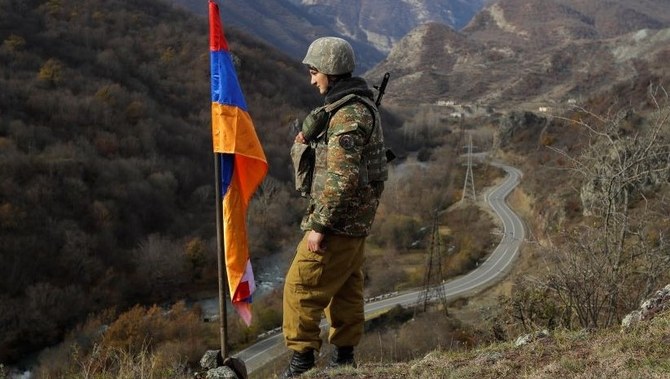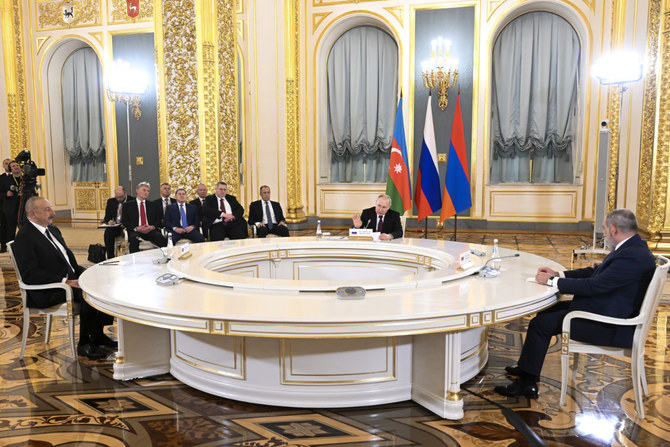
The tensions and the looming specter of a potential armed conflict between Armenia and Azerbaijan not only jeopardize the stability of the South Caucasus region, but also pose challenges to the existing economic and political interests of the Gulf Cooperation Council states, which consistently urge the parties to de-escalate tensions.
Historically, the decades-long dispute over the Nagorno-Karabakh area has been an important determinant in GCC states’ relations with both Baku and Yerevan. This dispute has entangled several countries in the region. Turkiye has backed Azerbaijan by all means, while Iran historically provided an economic lifeline to Armenia, whose primary backer has long been Russia. In the 2020 war, Israel also entered into the equation, aligning itself with Turkiye and Azerbaijan.
In contrast, the GCC countries have refrained from taking sides in the dispute, consistently calling for peace and welcoming the ceasefire that followed the 2020 conflict. Compared to Russia, Iran and Turkiye, the GCC states remain relative newcomers and small players in the region. And unlike these other stakeholders, the GCC states’ interest in expanding relations with Baku and Yerevan is not driven by historical or ideological motivations; it is purely economic.
Over the past decade, the GCC states’ interests in the South Caucasus have gained momentum, as they have pursued a proactive geopolitical and geoeconomic agenda with both Baku and Yerevan that is in line with their strategic plans to diversify their economies beyond the traditional oil sector. The reciprocal visits and agreements between GCC states, Armenia and Azerbaijan reflect a mutual desire to broaden their relations.
However, it is noteworthy that each Gulf state pursues relations with both of these countries based on their own national interests. For instance, Saudi Arabia historically sought to support Azerbaijani rights on the issue of Nagorno-Karabakh, even reiterating its support during the 2020 Nagorno-Karabakh war. The Kingdom was one of the first countries in the world to recognize Azerbaijan’s independence and open an embassy there. On the other side, Saudi Arabia is the only GCC state that does not have diplomatic relations with Armenia. The Kingdom’s policy is motivated by its prominent leadership role in both the region and the Muslim world, as well as by Armenia’s close relations with Iran.
However, there have been recent signs of improving relations between Riyadh and Yerevan. This was particularly evident in 2021, when Armen Sarkissian became the first Armenian president to visit the Kingdom. This diplomatic gesture was followed by a historic in-person meeting between the foreign ministers of the two nations in 2022, which took place on the sidelines of the Munich Security Conference in Germany. Furthermore, in June this year, commercial flights between Saudi Arabia and Armenia began operating for the first time. Nevertheless, diplomatic ties are yet to be established.Conversely, other GCC member states maintain embassies in Yerevan, and vice versa, and enjoy close ties with Armenia, most notably the UAE and Kuwait.
An essential aspect of the Gulf states’ relationships with both Armenia and Azerbaijan revolves around economic cooperation. In recent years, Emirati-Armenian relations have seen significant advancements, with UAE investments in Armenia experiencing a substantial uptick over the past two years. Energy collaboration continues to play a pivotal role in their economic partnership. In 2021, the Emirati company Masdar embarked on a substantial investment venture in cooperation with the Armenian National Interests Fund to construct a solar power plant. In the same year, the UAE also inked agreements on renewable energy pilot projects with Azerbaijan.
Saudi Arabia, too, has entered into several agreements with Azerbaijan aimed at fostering collaboration in the realm of renewable energy. In 2012, the State Oil Company of the Republic of Azerbaijan and Saudi enterprise Soroof International signed an agreement for oil and gas ventures. Six years later, Saudi Aramco established a subsidiary company to further explore opportunities in the oil and gas industries in Azerbaijan and Central Asia. Last year, the Kingdom and Azerbaijan signed a memorandum of understanding on electricity generation in the Caspian Sea. Additionally, Riyadh made a substantial investment of $300 million in the Absheron-Khizi wind power plant.
After the Azerbaijani presidential adviser visited Saudi Arabia in August, the Armenian foreign minister this month visited Abu Dhabi, where he presented the situation in Nagorno-Karabakh to the Emirati present, seeking his country’s support in both diplomatic and humanitarian terms.
While Kuwait has been neutral in the Armenia-Azerbaijan conflict, a 2022 statement by its ambassador in Yerevan revealed its stance. “Kuwait cannot be indifferent and understands the pain that the Armenian people are experiencing at this moment,” it said. Kuwait’s historical recollection of the Iraqi invasion in 1990 plays a pivotal role in shaping its approach to various global crises.
On the flip side, Qatar, a close ally of Turkiye, has expressed support for Azerbaijan’s position in the Nagorno-Karabakh conflict, while trying to maintain relations with Armenia as well. A clear instance of Qatar’s balancing act can be observed in the 2020 conflict, when it was reported that Qatar Airways brought aid from the Armenian community in the US to Armenia.
Armenia and Azerbaijan seek cooperation with the GCC states, particularly in terms of their investment potential. However, the ongoing tensions between these two neighbors pose risks to the Gulf states’ long-term economic plans in both countries. The perspectives of the GCC states toward Azerbaijan and Armenia are significantly shaped by the tensions between them. Conversely, these tensions also present opportunities for involvement in diplomatic resolutions through the implementation of soft power tools. Notably, the likes of Saudi Arabia, Qatar and the UAE have a history of mediation thanks to their proactive policies and can leverage their relationships with both sides to help alleviate the tensions over Nagorno-Karabakh. This would be in the interest of all parties.












